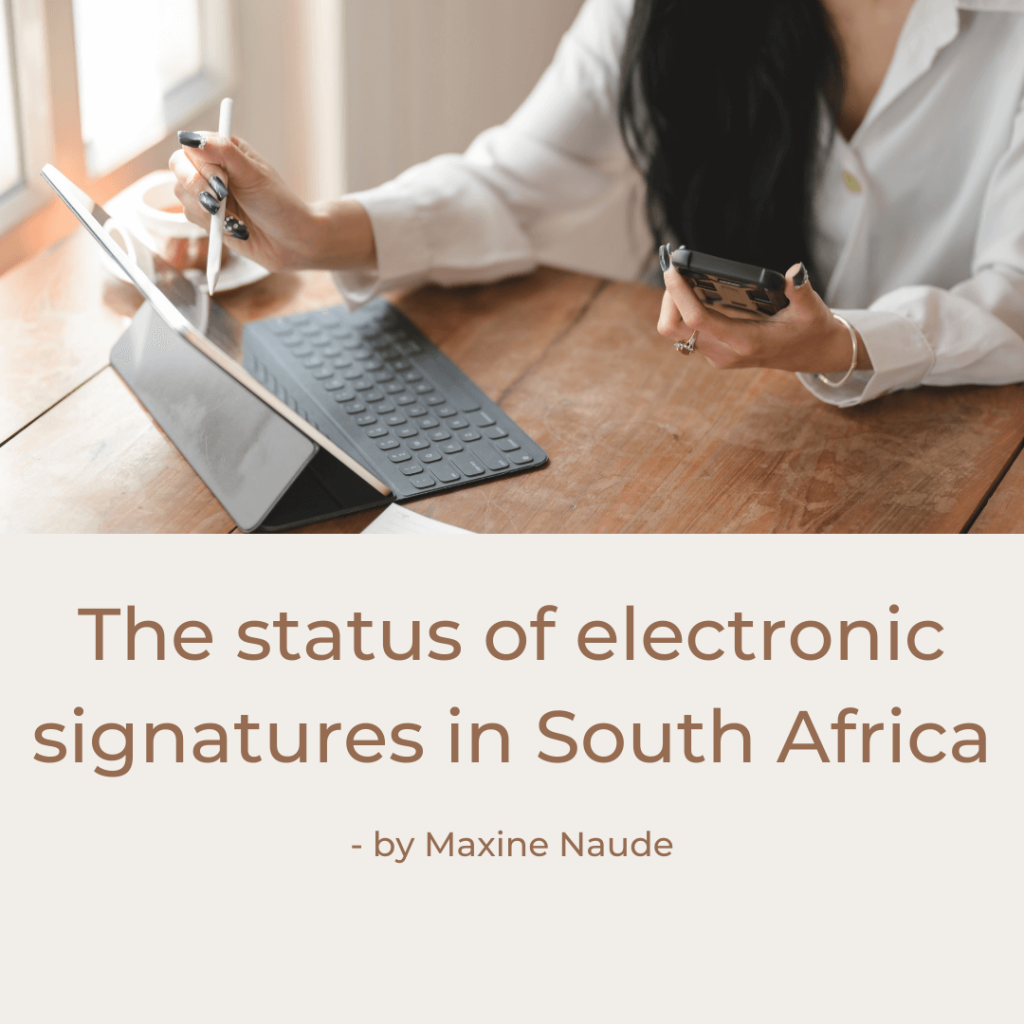Author – Maxine Naude
The Electronic Communications and Transactions Act No. 25 of 2002 (ECTA) provides that an electronic signature is not without legal force and effect merely because it is in electronic form, which indicates that electronic signatures are legally recognised in South Africa.
THE DEFINITION OF AN ELECTRONIC SIGNATURE
It is generally accepted in commercial practice that the primary functions of signatures, whether standard or advanced, are to identify:
- the identity of the signatory;
- that the signatory intended the signature to be his / her signature; and
- that the writing or text to which the signature is associated is adopted or approved by the signatory.
Section 1 of the ECTA incorporates these requirements by defining an electronic signature as “data attached to, incorporated in, or logically associated with other data and which is intended by the user to serve as a signature”.
STANDARD ELECTRONIC SIGNATURES
The ECTA provides for two different situations. Where the parties explicitly require an electronic signature and where the parties do not explicitly require an electronic signature.
In terms of Section 13(3) of the ECTA, where an electronic signature is required by the parties, but the parties have not agreed on the type of electronic signature (standard or advanced) to be used, the electronic signature will be valid if the method used:
- identifies the person;
- indicates the persons approval of the information indicated; and
- having regard to the circumstances, the method used was reliable and appropriate for the purposes for which the information was communicated.
The court in Global & Local Investments Advisors (Pty) Ltd v Fouche (Global v Fouche (2020) ZASCA 8) provided that not only do the parties have to agree that a signature is required but also that a signature is required in electronic form.
Broadly, Mr Fouche, a mining consultant, gave a written mandate to Global to act as his agent and invest money on his behalf. It was stipulated that all instructions were to be emailed with the client’s signature. Fraudsters hacked his email account with instructions to transfer money to a third party, with Mr Fouche’s signature at the end thereof.
The court held that a signature in the everyday and commercial context serves the purpose of an authentication and verification. In this case, the agreement did not explicitly refer to an ‘electronic signature’ and therefore did not constitute a signature as required by such agreement.
Therefore, the parties must not only explicitly agree to the use of a signature but must also agree to such signature being in electronic form. The signing method must also comply with the requirements in the ECTA.
Where an electronic signature is not required by the parties, the absence of the electronic signature does not invalidate the expression of intent or other statement of intent merely on the grounds that it is in the form of a data message or that it is not evidenced by an electronic signature.
In other words, if the signatory expresses his / her intention, the absence of an electronic signature will not invalidate such expression or statement of intent. An example of an agreement formed without using a signature is a click-wrap agreement.
“Click-wrap agreements are online agreements structured in such a way that visitors to a web site attempting to download programs offered by a vendor are required affirmatively to agree to the contractual terms and conditions of the vendor by clicking an icon that usually states ‘I agree’ or ‘I accept’.” ( (De Andrade, 2020) )
ADVANCED ELECTRONIC SIGNATURES
It is important to note that in terms of Section 13(1) of the Act, where legislation or the common law states that the signature of a person is required, the electronic signature will only be valid where it is an advanced electronic signature, unless stated otherwise.
An advanced electronic signature must be issued by an accredited Authentication Service Provider. Such providers are appointed and published by the South African Accreditation Authority. Currently, there are only two accreditation providers, the SA Post Office and LAWtrust.
CONCLUSION
In sum, where parties agree to the use of a signature in electronic form, such signature will only be valid where it meets the requirements set out in Section 1 and 13 (3) of the Act. In contrast, where the parties do not agree on the use of a signature in electronic form, the lack of an electronic signature will not invalidate the statement of intention provided in the data message. Importantly, only an advanced electronic signature must be used where a signature is required by legislation or other law, unless stated otherwise.
